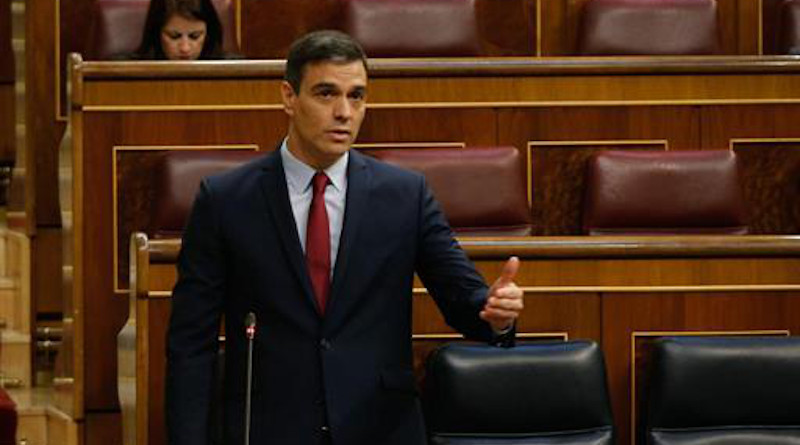Spain’s PM Sánchez: ‘Unity Not Only Saves Lives, But Also Companies And Jobs’
Spain’s Prime Minister Pedro Sánchez called on the political groups in the Lower House to work together to push on with the economic and social recovery.
Sánchez also stressed that health decisions are based on strictly technical criteria and that the state of emergency is not a political project by the government, but rather a necessary constitutional instrument to tackle the pandemic and culminate the de-escalation.
At the government control session in the Lower House of Parliament, Sánchez claimed that the COVID-19 crisis has three dimensions: health, social and economic, and that in the latter area the outlook points to a virtual halt in 2020 and a recovery in 2021.
“If this crisis has shown us anything it is that the way forward with this recovery is through unity,” Sánchez declared in his response to Pablo Casado, from the People’s Parliamentary Group. The President of the Government quoted, by way of example, the approval on Tuesday by the Council of Ministers of the Royal Decree-Law to extend the temporary lay-off plans (Spanish acronym: ERTE) until June 30, following an agreement reached between the government and social stakeholders.
Sánchez underlined that this week work begins by the Parliamentary Committee for the Social and Economic Reconstruction in the Lower House, to which end he called on all groups to “forge this unity because it not only saves lives in this crisis, but can also save companies and jobs”. According to Sánchez, the Spanish people want the government and the opposition to act together against the common enemy, namely the virus.
Pedro Sánchez also stated that, unlike what happened in the 2008 crisis, the areas affected by the pandemic are not the least efficient or the victims of a real estate bubble, but rather they are competitive sectors that create jobs, but which are highly exposed to the health restrictions, such as tourism.
For this reason, Sánchez explained, the government’s efforts are focused not only on creating a safety net to protect families, but also on sustaining the productive fabric with measures to support companies, independent contractors and employees. Among these actions, he quoted the ICO lines of credit which now account for almost 300,000 operations, the ERTEs and the benefits for the cessation of activity.
Virus is still here
As regards the meaning of the “new normality” following the de-escalation – a matter raised by Aitor Esteban, from the Basque Parliamentary Group, Sánchez stated that the victory over the virus will only be complete when a vaccine or a therapeutic remedy exists.
Meanwhile, Sánchez added, it will continue to be necessary to respect the rules recommended by the experts and scientists, such as maintaining a minimum safety distance and the use of face masks on public transport. “In short, all those matters that have become normal as a result of the emergency caused by this pandemic,” Sánchez said.
Sánchez reiterated the importance of warning the public not to ease up the levels of protection because “the virus remains present throughout society,” an idea shared with the regional presidents at their weekly meetings, he remarked.
In relation to the decisions by the health authorities in the de-escalation process, Pedro Sánchez stated that they are adopted based on “strictly technical”, and not political criteria, “because we are talking here about public health, about saving lives”.
Sánchez also rejected the idea that the state of emergency amounts to any form of recentralisation of powers devolved to the regions, and expressed his interest in opening a political debate in the Lower House, once the de-escalation is completed, on strengthening the coordination mechanisms to address any potential second wave.
State of emergency is a necessity, not a political project
“The state of emergency is not a political project,” argued Pedro Sánchez, in response to a question raised at the control session by Oskar Matute, from the Euskal Herria Bildu Parliamentary Group.
The government’s program, Sánchez said, continues to be the one advocated in the investiture debate, which received the support of a majority of the MPs – to strengthen the Welfare State, to guarantee and extend rights and liberties, to strengthen Spain’s role in Europe and on the international stage, and to push through a just ecological transition and reindustrialisation under parameters of sustainability, among other matters.
The current crisis, Sánchez added, “shows that this roadmap, this government program we presented, will be even more important in the coming years”.
The state of emergency “is quite simply a necessity to provide a response, from a constitutional perspective, to a pandemic that has hit not just Spain, but, for the first time, the whole world,” Sánchez said.

